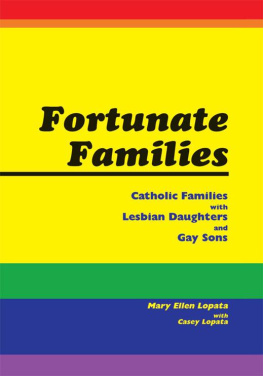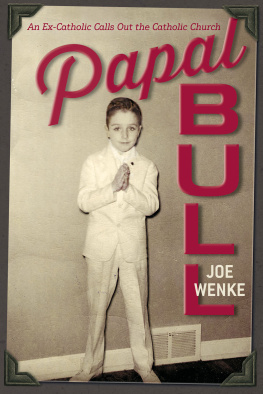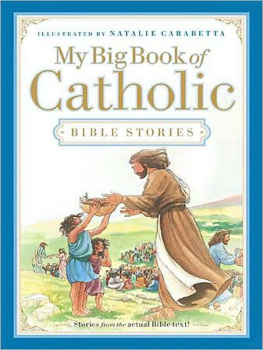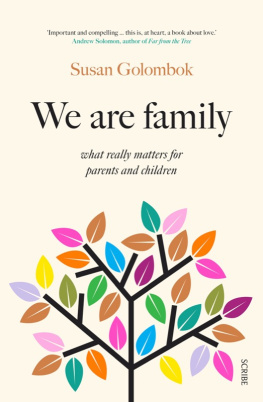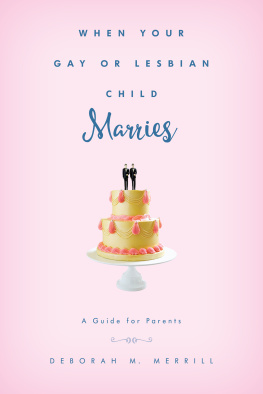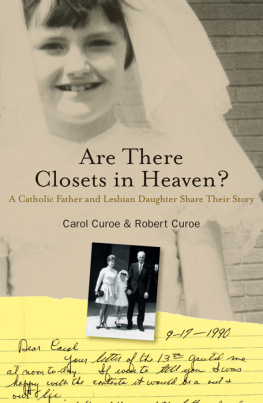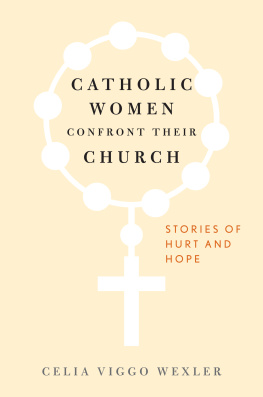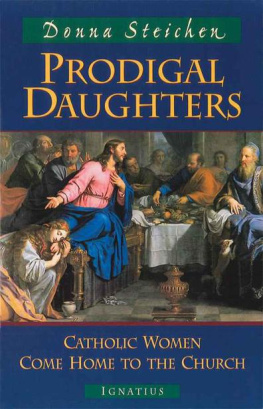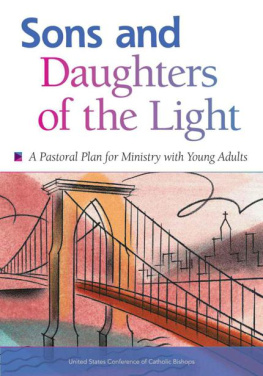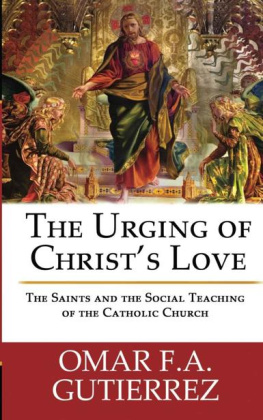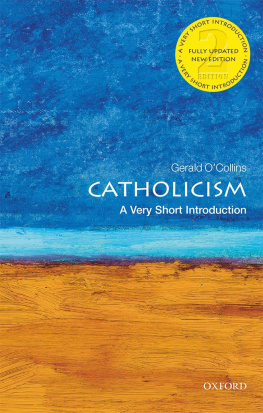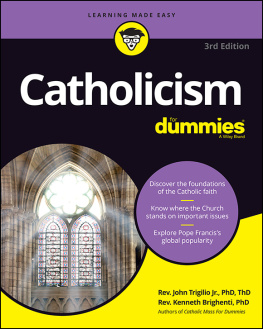Fortunate Families
Catholic Families
with
Lesbian Daughters
and
Gay Sons
Mary Ellen Lopata
with
Casey Lopata
TRAFFORD PUBLISHING
Copyright 2003 Mary Ellen Lopata. All rights reserved.
No part of this publication may be reproduced, stored in a retrieval system, or transmitted, in any form or by any means, electronic, mechanical, photocopying, recording, or otherwise, without the written prior permission of the author.
National Library of Canada Cataloguing in Publication Data
Lopata, Mary Ellen, 1944
Fortunate families : Catholic families with lesbian daughters and gay sons / written by Mary Ellen Lopata and Casimer Lopata.
Includes bibliographical references.
ISBN 1-4120-1189-2
I. Lopata, Casimer, 1941-II. Title.
HQ759.9145.L66 2003306.874C2 003-904 723-7

This book was published on-demand in cooperation with Trafford Publishing.
On-demand publishing is a unique process and service of making a book available for retail sale to the public taking advantage of on-demand manufacturing and Internet marketing. On-demand publishing includes promotions, retail sales, manufacturing, order fulfilment, accounting and collecting royalties on behalf of the author.
Suite 6E, 2333 Government St., Victoria, B.C. V8T 4P4, CANADA |
Phone | 250-383-6864 | Toll-free | 1-888-232-4444 (Canada & US) |
Fax | 250-383-6804 | E-mail |
Web site | www.trafford.com | TRAFFORD PUBLISHING IS A DIVISION OF TRAFFORD HOLDINGS LTD. |
Trafford Ca | talogue #03-1567 | www.trafford.com/robots/03-1567.html |
10 9 8 7 6 5 4 3 |
Contents
1
Introduction
2
Connies Story: Be True To Who You Are
3
Feelings & First Reactions
4
Mary Anns Story: I Know Her, I Love Her
5
Beyond Mom & Dad:
6
Phils Story: My Son Is No Joking Matter
7
Church Teaching, Pastoral
8
Sjs Story: No Better Gifts
9
Parents Pastoral Voices
10
Lens Letter: Good Morning, Bishop
11
Always Our Children
12
What Fortunate Families Need
13
Florence & Steve: Persons Of Faith Against Bigotry
14
Strategies For Pastoral Care
15
Conclusion: In Us Gods Love Is Revealed
Dedicated
To our grandchildren Grace, Maxine, Griffin, Caz, Lily, Julius, and Shira and our godson, John David
... they are hope for the future.
And to all the gay and lesbian people who have touched our lives... they help us see with our hearts.
Grateful acknowledgement goes to:
All the parents who completed my initial survey, all those who have called on Catholic Gay & Lesbian Family Ministry or attended our days of reflection;
Mary Ann, John, Steve, Florence, Ann, Phil, Len, Molly, S.J., Connie, Stan, Julie and Dick for sharing their stories;
My children, Jim, Andy, Linda and Dan for their generosity and forthrightness of spirit;
My husband, Casey, who knows all the technical church answers but always remembers the person;
Luanne Brando for giving fresh eyes to proofreading;
Len Szumiloski and Pat Lindahl for their unending good humor and encouragement;
Karen Rinefierd for her reasoned pastoral insights;
And lastly Rosalie Muschal-Reinhardt who believed I could write this book, who kept the project on track, who told me this book will be a big help to many parents and their gay and lesbian children-and never ever let me forget it.
Someday, you will know how blessed you are and how special your son is, because he is gay. He will be a special delight and comfort to you. My friend, Mary, spoke these words when I told her my son is gay. That was many years after Jim came out to me and the truth of her comment was becoming a reality in my life, so I thanked her with a hug and tucked her affirming words in my heart.
Years later, as a graduate student studying how having a homosexual child impacts the family, I came upon Walter L. Williams The Spirit and the Flesh. Much of Williams book focuses on the social position of the berdache. Berdache is a word used by French and English explorers to describe a physiological male who does not fulfill the standard male role in society; one who has a non-masculine character, and is often considered effeminate. However, to many Native Americans the term berdache conveys the positive qualities that two-spirited persons bring to some Native American tribes. Williams describes how these societies and families appreciate the uniqueness of certain children who exhibit traits of both sexes, and do not force each and every child to conform to established gender roles. When these children are identified, their talents are nurtured, and they grow up to be great assets for the whole tribe. They are seen as having two spiritsmasculine and feminine. As adults they often become go-betweens, negotiating and reconciling disputes between males and females in the tribe. In some tribes they are also mediators between this world and the spirit world, and are greatly honored for this important ritual role in the community. According to ethnographer W.W. Hill, a family with such a member was considered, by themselves and everyone else, as very fortunate.
Very fortunate! How different from our own culture which values conformity, and which is so uncomfortable with people who are different. When that difference involves gender roles or has a sexual aspect, our culture often labels such distinctions as deviant or unnatural. We can learn from tribal cultures that appreciate each individual, value each persons talents, characteristics, and skills, and encourage the development of each persons unique qualities for the benefit of the family as well as the good of the whole community.
I thought about my own family. Did we feel fortunate to have a homosexual son and brothera two-spirited personin our family? What about all the other parents of gay sons and lesbian daughters that I knew? Did they consider themselves fortunate? Based on my own experience, I suspected that many privately did feel fortunate but they would be intensely uncomfortable, somewhat embarrassed, perhaps even afraid, to let others know that their family was so blessed. If society will not accept the individual who is different, it will surely not understand the family who celebrates that distinction.
Our oldest son, Jim, who is gay, was born into a traditional Catholic family and baptized two weeks later. He went to Mass virtually every Sunday and Holy Day of his life, attended school of religion classes regularly, went on yearly church retreats, sang in the folk choir, and was a leader in the parish teen group. When he went away to college, he continued to attend Mass and be an active part of the universitys Catholic community.
As a family, we were active participants in the family life ministry of our parish, forging friendships with other families with similar religious and moral values. For adult role models, our children had a group of moms and dads committed to what they understood to be core gospel values: love of God and love of neighbor. These values were not empty sentiments but lived realities, demonstrated, for example, by supporting the person next door whose spouse was hospitalized, as well as caring for the Vietnamese orphan halfway around the world. We did not just go to church; we believed (and still do) that we, as the people of God, are the Church, and must work unceasingly to live up to that responsibility.
Next page
